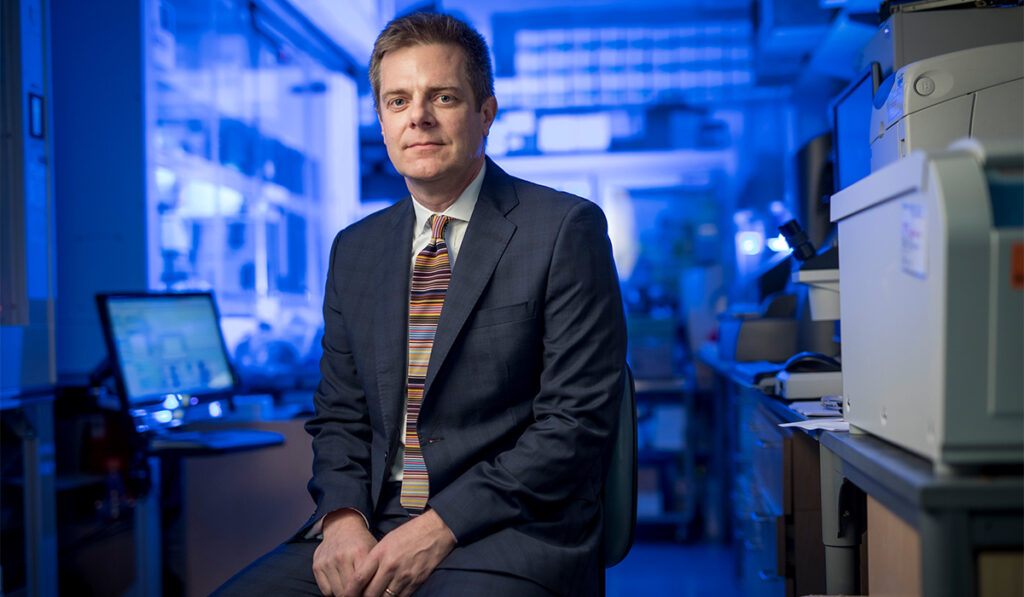With respiratory syncytial virus (RSV) infections spiking in the United States, the recent approval and availability of RSV vaccines for use in infants, pregnant people and the elderly is a welcome addition to the armamentarium for preventing pneumonia and other severe respiratory disease.
Vanderbilt Vaccine Center Director James E. Crowe Jr., M.D., and his research team pioneered the use of monoclonal antibodies to neutralize viral infections and helped develop multiple candidate antibody drugs tested in humans. Over the past several decades, Crowe and colleagues have demonstrated that the key protein on the surface of RSV that promotes immunogenicity is its fusion protein.
After completing discovery, basic science, crystallography, and animal testing, the team identified one potently neutralizing antibody that is effective against both RSV and human metapneumovirus (hMPV). The research appears in Cell Host and Microbe.
“Our general strategy is to have a portfolio of antibodies that can cover multiple viruses,” Crowe said. “Using antibodies that inhibit more than one virus can help reduce the expense and lessen the burden of antibody delivery, so we can get these life-saving biologic drugs to more people.”
“Using antibodies that inhibit more than one virus can help reduce the expense and lessen the burden of antibody delivery, so we can get these life-saving biologic drugs to more people.”
Translating Discovery to the Clinic
In the study, the investigators isolated and characterized from a single human donor a panel of antibodies that recognizes the RSV or the hMPV F protein. One cross-neutralizing antibody, RSV-199, was found to neutralize eight different RSV A, RSV B, hMPV A2, and hMPV B2 strains with overall potencies comparable to RSV-specific antibodies.
Now comes the difficult part, Crowe said.
“Turning antibodies into products is a whole different type of science. It’s more expensive, and involves manufacturing, formulation and delivery. Universities are typically not skilled in that.”
To overcome this hurdle, Crowe and his team have added “developability” studies to their workflow. These studies address manufacturers’ concerns by providing test results for factors like antibody stability and production feasibility.
“That way when we turn to a company, we’ve ‘de-risked’ the antibody,” Crowe said. “It’s not traditional for academics to do that. If we want to move academic discoveries to the clinic, we need to learn how to partner well with companies. In our experience most companies welcome the effort and will come halfway toward us with more confidence in licensing our products.”
“If we want to move academic discoveries to the clinic, we need to learn how to partner well with companies.”
Central Player in the Global Fight
At the peak of the COVID-19 pandemic, the Vanderbilt Vaccine Center served as a major hub for prophylaxis development through the federal Pandemic Prevention Platform (P3) program.
Under Crowe’s leadership, large panels of monoclonal antibodies were rapidly isolated. Two were ultimately selected by AstraZeneca, progressed to phase 3 trials, and then were authorized by the FDA for emergency use.
Crowe earned significant recognition for his COVID-19 work, including TIME magazine’s Best Invention of 2022 award, a 2022 Harrington Prize, a Building the Foundation Award from Research!America and a Golden Goose Award from the American Association for the Advancement of Science.
He recently received the 2024 American Society for Microbiology Award for Applied and Biotechnological Research, and was honored by the Association of American Medical Colleges, who called his group’s contribution to protecting immunocompromised people from COVID-19 “a triumph of translational medicine.”
“We’re grateful to all of the supporting societies and institutions who are getting the word out that federal funding for basic science has an enormous return on investment,” Crowe said.
Burden of Childhood Disease
None of this could have been possible without the diligence of basic science researchers, including those at the Vanderbilt Vaccine Center, Crowe says. His team continues to publish foundational studies of the viral and immunologic mechanisms that drive antibody drug development for infectious diseases.
Crowe also remains committed to fueling interest in infectious disease research by any means necessary, whether delivering a TEDx Talk, appearing on a podcast, overseeing multiple robust social media accounts, connecting with university multimedia, or commenting to the local news.
He recalls becoming impassioned about childhood infectious diseases after an unforgettable experience as a young medical student in a rural hospital in East Africa. There, he witnessed firsthand the impact of staggering childhood mortality, particularly the pain it leaves in its wake. He remembers one child who arrived at the hospital too late – already a victim of an infection.
“That mother let out a wail that filled the entire room and the soul of everyone who was there,” Crowe said. “I can’t forget that moment.”





